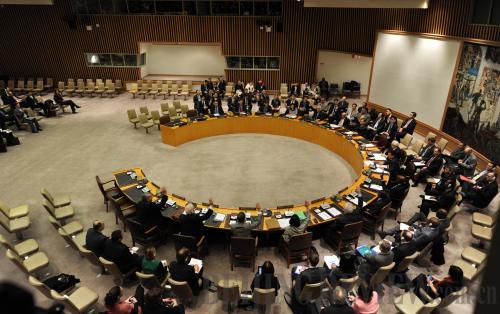|
 |
|
DENOUNCED ONCE MORE: The UN Security Council votes on a resolution condemning North Korea's recent nuclear test. The resolution was passed unanimously at UN headquarters in New York City on March 7 (NIU XIAOLEI) |
The Chinese Government's policy approach to the Democratic People's Republic of Korea (DPRK) has been under debate since the latter conducted its third nuclear test in February. Some critics accused China of "indulging" the DPRK for years instead of restraining and sanctioning it along with other countries, neglecting to effectively "guide" Pyongyang's domestic and foreign policies.
According to them, China's DPRK policy during the past decades has resulted in failure, suggesting that China should be held responsible for instability on the Korean Peninsula caused by the DPRK's radical behavior. Their understanding is one-sided and incorrect. The critics have missed the point of China's interests in the DPRK and misunderstood the core of peninsula issues.
Effective policy
The central goal of China's DPRK policy is to sustain the steady development of bilateral relations. The DPRK is an important partner in China's foreign strategy and a key point in its diplomacy with neighboring countries. Regardless of the experiences and beliefs of each side, they are neighbors. China cannot simply abandon the DPRK as other governments have done, nor treat the DPRK like a dependent child. It will continue with the current state of communication based on equality and mutual respect.
As a small country, the DPRK's mentality is particularly sensitive and complicated. It tends to categorize China's suggestions and different ideas with the label of bully. Although it occasionally lashes out with a temper, it has never diverged from the normal track of China-DPRK relations.
Beijing always stresses the importance of these relations. It welcomes Pyongyang's increased efforts to promote development, raise people's living standards, improve its external environment, and conduct normal communication with other countries. It has consistently carried out necessary persuasive actions with Pyongyang in keeping with the strategy of balancing national interests with diplomatic principles. It never seeks to impose its view or development model on Pyongyang. Perhaps China's influence on the DPRK will not be apparent at once, but the effects will show in time.
The late DPRK leader Kim Jong Il visited China many times, mainly to observe China's reform and development progress. He also repeatedly urged the DPRK's younger generation to cherish the China-DPRK relationship and learn more from China's experience. Current DPRK leader Kim Jong Un most likely shares the same attitude. Now the DPRK has begun to show signs of revitalization, especially since the younger Kim took office. These results could not flourish with a failed DPRK policy.
Pushing for the denuclearization of the Korean Peninsula is an important goal of China's DPRK policy. The DPRK nuclear issue has existed for decades, since before the Cold War ended 22 years ago. But the Korean Peninsula has remained in a Cold War state, with lingering hostility between Washington and Pyongyang and between Pyongyang and Seoul.
In spite of the difficulties, China has insisted on mediation through a bilateral channel and the six-party talks, and succeeded in slowing down the DPRK's pace of possessing nuclear weapons and discouraging Seoul's desire to do the same. Its efforts have helped avoid a deteriorating situation, such as a nuclear arms race or even a military conflict on the peninsula. In this sense, China's DPRK policy is a success, not a failure.
| 